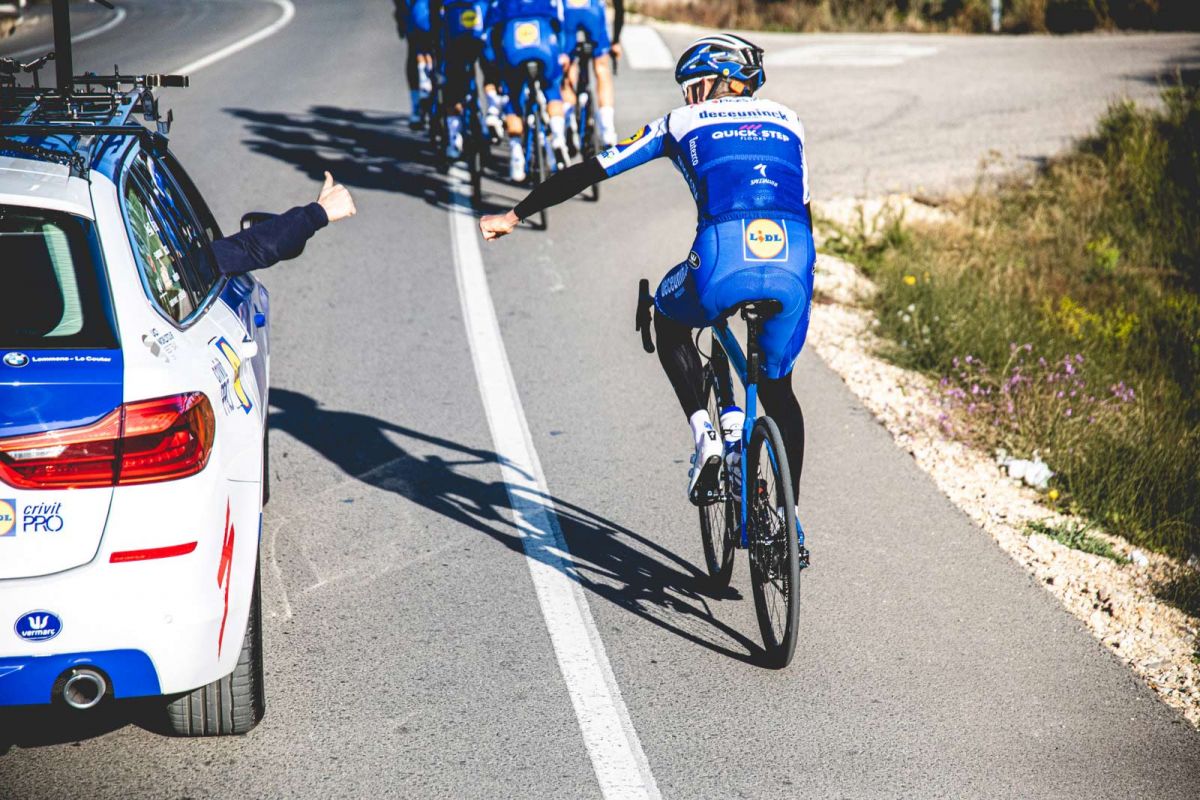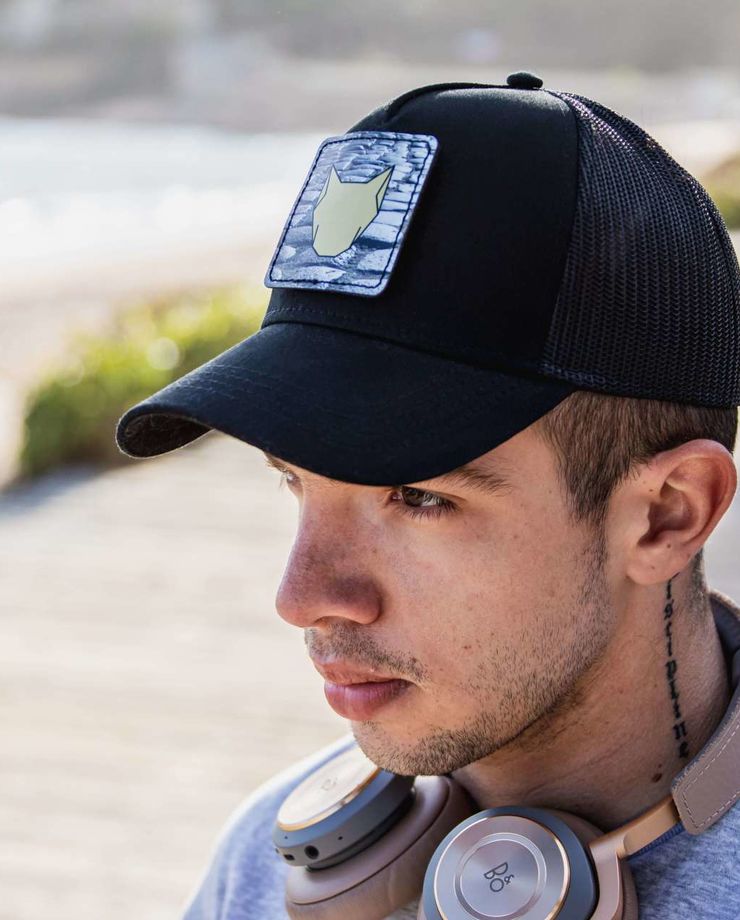Deceuninck – Quick-Step’s sports directors look back on some of their most memorable days in the saddle.
Davide Bramati
When I took my first and only stage victory, at the 2000 Vuelta a España, I felt I was flying. That season had been a very good one for me. In the spring I came close to a stage victory at the Giro d’Italia, in Feltre, and had the same good condition in September, which gave me the feeling I could do something nice at that Vuelta. In the morning of the stage to Salamanca, our sports director told us that we should go for the victory and attack from the beginning. The first hour was full gas and it took a while for a breakaway to form. When it happened, I was there together with Biagio Conte, Fabio Baldato, Marco Zanotti and Pedro Diaz. We worked well together until with ten kilometers to go, when the attacks began. When these skirmishes stopped for a brief moment, I made my move, opened a gap and arrived alone in Salamanca. It’s hard to put in words the happiness I felt. Mapei’s management was there and remained overnight to celebrate my win, instead of traveling back home. It ended up being a great race for us, with my success, Freire’s brace of stage wins, and the third place of Tonkov, who was my roommate. That win is a moment I look back on with pride and savour every time, I even have the picture of that victory framed in my house.
Brian Holm
I was quite small as a teenager and had bad stuttering, which did not make me really confident, I think people will agree I was quite a shy child. I started cycling in 1972, as a 10-year-old, and in my first years in the sport I fought more not to be last in a race than to for the win. 1969 World Amateur Champion Leif Mortensen became my coach as junior and that was the first time I met somebody who had faith in me. Leif always said I will grow and just had to focus, be disciplined and be patient, and I did my best to follow his advice. Then, the 1980 National Junior Championships came, and I remember that the race was held in Ebeltoft, on a hilly course. My teammate from Amager CR was youth star Jack A. Olsen and he was in the break with a faster Espersen from Gladsaxe CC, where also Johnny Weltz rode. On our team was also Matti Breschel’s dad, Tom, and with two laps to go he asked me: “Jack will be second. What should we do? Chase them down and risk our lives?” I took the chance of my life and said: “To hell with this, let’s go for it!” We rode full gas, caught them and I won the uphill sprint ahead of Tom and Johnny Weltz. Hands down, that was the best day of my life! From that day, I improved my stuttering and knew that I was good at something for the first time in my life. I also learned that the best victories come when you dare to take risks and think out of the box. Other wins followed – as junior, amateur, pro and sports director – but nothing comes close to that day in June 1980.
Klaas Lodewyck
I’ll go with the 2011 Amstel Gold Race, when I was part of the team that helped Philippe Gilbert take his second victory at the race. It was the first time that we actually started a big Classic having a potential winner within our ranks and we really looked forward to that Sunday and helping Philippe defend his title. My job was to start pulling after 200 kilometers and I gave absolutely everything once I moved to the front of the peloton. In the end, Philippe claimed another win, his first of that year’s incredible Ardennes Triple, and it felt like a victory also for me, because it boosted my confidence and motivated me to do better in the next races.

Wilfried Peeters
I know Tom Steels said that his victory at the 1999 Gent-Wevelgem was the worst day of his career in terms of how he felt until the finish due to the pressure, but for me it was maybe my best race. We controlled that race with just two riders – myself and Johan Museeuw – despite the presence of many top guys in the group. I went over my limit in that race, I had very good legs and felt everything was perfect on that particular day. Of course, during my time as a pro, I finished twice on the podium at Paris-Roubaix or won Gent-Wevelgem, but that was completely different, those were days where I could feel the pressure and for that reason, I was very nervous. It wasn’t the case in 1999, where I felt that nothing could go wrong and I could continue to pull for ever. Not every time a victory is one of your best days on the bike and that was the case for me in that Gent-Wevelgem.
Tom Steels
Winning the Belgian National Championships in 2004 was amazing, one of my finest victories! It stands as the best race of my career, for a number of reasons. The Nationals are always special, as you ride with your countrymen and things can be different than in a normal race. That year, in Tessenderlo, an early breakaway built an eight-minute lead, but we gradually reduced that advantage, and on lap eight, I attacked to get the speed back in the bunch. Around twenty riders joined the move, including Philippe Gilbert, Nico Mattan, and Geert Steegmans. We had a good pace and by the moment we caught the escapees, the group was reduced to 14 guys. With two laps remaining, it was only me, Geert Verheyen and defending champion Geert Omloop at the front, and in the sprint I prevailed. That race was probably the best I ever did, physically but also tactically, aside from the fact that it made me the rider with the most Belgian titles. Holding the record, with four wins, made me so proud, fed my confidence, and very importantly, helped me return to a World Tour team the next year.
Geert Van Bondt
It’s not easy to give an answer to this. A great day was when I went out training for the first time, as a 15-year-old, that’s something I would never forget. There were also the days when I was 17 and used to go together with Peter Van Petegem – who went at the same school as I did – and just train for several hours after class, discovering all those great climbs – Koppenberg, Paterberg, Taaienberg – before returning home at 9 in the evening, after a 40-50 km ride. Of course, as a pro, my greatest joy came in 2000, when I won Gent-Wevelgem. That year was the best of my career and I arrived in fine form at the start of the race, where we wanted to do a good preparation for De Ronde. We were so strong that day, I remember we caught the breakaway before taking on the Kemmelberg for the first time, and just shattered the peloton there, of the nine guys left at the front, three being from our team: myself, Peter Van Petegem, and Andreas Klier. As the final approached, Peter told me that if I want to win, I should just seize my chance and see if I could put in a strong attack. That’s what I did and got a small gap as the others hesitated, so I just continued and left everything out there on my way to the finish line, where I celebrated what was not just the biggest moment of my career, but also a victory of the entire team.
Rik Van Slycke
One of the best feelings I had in my entire life was when I completed my first ever Tour de France. Before the start of the 1988 race, my friend Frank Hoste – not just a training partner back then, but also someone to whom I looked up to in my region – came to me and told me that I had to arrive in Paris, because only then I could consider myself a pro rider. I thought of his words over the next three weeks every time I struggled and had a bad day, and in the end, I made it. On the last day of the race, there, in Paris, he told me that now I am a pro. That unique feeling, of being there after a tough three weeks, was the best feeling I ever had, unrivalled even by the joy of winning races later in my career.
Photo credit: ©catharsis-productions.com


